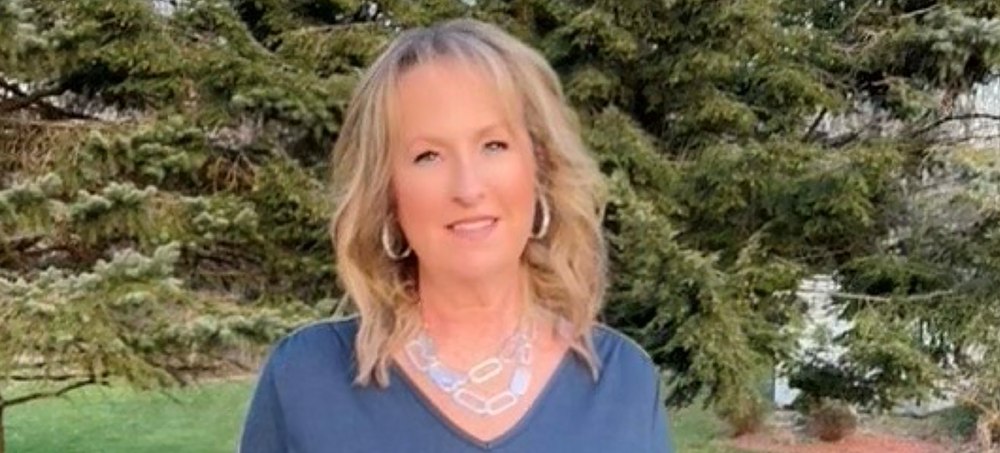
“You know when you get a ‘brain freeze’ from eating ice cream too fast? That’s what it felt like,” says Kelly Olivo. The 55-year-old mother of four lives in the hamlet of Slate Hill, about 75 miles northwest of New York City, and life was good — she was working as an office manager for a local chiropractor, cheering on her daughters at softball, and tackling DIY projects at home — until she was sidelined by powerful head pain. It was a long journey, but thanks to Dr. Srikanth Boddu and the entire team at the Weill Cornell Medicine CSF Leak Program, Kelly is now back to full strength.
“It started about three and a half years ago, but it didn’t feel like a typical headache,” Kelly recalls. “Any time I’d cough, bend over, laugh, or yell, my headache would just get worse. I soon discovered that the only way to relieve my pain was to lie flat.”
"I would try so hard to do things, but I would end up in tears from the pain, then back to bed I would have to go.”
Nothing seemed to help, no matter how many specialists Kelly saw. “I went to many doctors, who all diagnosed me with migraines and put me on migraine medications that never worked,” she recalls. “For more than two years I tried massages, chiropractors, even new pillows. Nothing worked.”
Kelly's symptoms worsened, with the headaches progressing into a ringing in the ears, extreme fatigue, stomach issues, and balance issues. “As I walked, I’d start leaning left,” she says. “Because of that, most of my day was spent lying down to manage my symptoms. My work suffered (it’s a good thing I have a great boss!) and I had no quality of life. I would try so hard to do things, but I would end up in tears from the pain, then back to bed I would have to go.”
For more than two painful years, none of Kelly’s doctors recognized that the head pain was from a CSF leak. “That’s not surprising,” says Dr. Boddu, “since the headaches and other symptoms are common to many different conditions.”
“Cerebrospinal fluid, or CSF, flows in and around the brain, spinal nerves, and spinal cord, nourishing and cushioning them,” says Dr. Boddu. “Sometimes a hole forms in the dura, the membrane that holds the CSF, causing a leak. In some cases we find an abnormal leakage of cerebrospinal fluid into an adjacent vein, which results in what is known as a CSF-venous fistula. Either way, the loss of CSF leads to low pressure in the skull, which can cause nausea, headaches, and other neurological symptoms. Diagnosing and attributing these symptoms to a CSF leak can be a challenging process.”
In her third year of the terrible pain, Kelly traveled to a New York City hospital to visit a headache clinic. “That was where I first heard about a CSF leak,” she says. “They tried putting in epidural blood patches (EBPs) to stop the leak, but those ultimately didn’t work. I was at a loss. But now that I had a diagnosis in hand, I narrowed my search to doctors who specialize in CSF leaks — which is how I found myself in Dr. John Park’s office at Weill Cornell Medicine.”
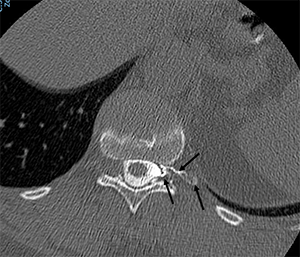
An advanced CT myelogram identified the source of the leak (arrows)
“Once Kelly reached out, we brought her in for an appointment immediately,” says Dr. Park, co-director of the CSF Leak Program at NewYork-Presbyterian and Weill Cornell Medicine. “The most important thing was to confirm the CSF leak and pinpoint its location. That’s why it’s so important to have a comprehensive program, with advanced imaging as well as treatment options.”
“The CSF Leak Program is truly a team effort,” says Dr. Gayle Salama, co-director of the CSF Leak Program and Director of Spine Imaging and Interventions in the radiology department. “Radiology’s role is to localize the leak — we put the pin on the map, so to speak, for our surgical colleagues; our tools and expertise are what help them navigate. In Kelly’s case, Dr. David Edasery, one of our CSF leak neuroradiologists, successfully identified that it was a CSF-venous fistula causing her CSF leak. He was also able to locate her CSF-fistula level with an advanced CT myelogram, which allowed the CSF leak team to create the most effective treatment plan. The collaboration among multiple subspecialties — in this case, diagnostic neuroradiology, interventional neuroradiology, and neurological surgery — is integral to delivering the highest level of comprehensive care to our patients.”
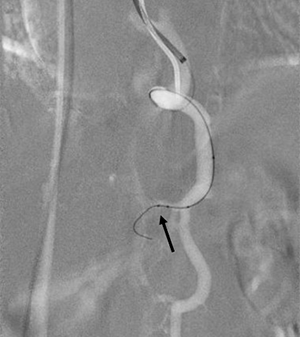
With the source of the leak identified, Dr. Boddu was able to navigate to its location using a tiny catheter threaded through the blood vessels. The minimally invasive procedure uses a kind of surgical "glue" to embolize, or seal, the leak.
“Soon after Kelly left my office, we were in a good place,” says Dr. Park. “We identified the location of the leak, and my colleagues in radiology and interventional neuroradiology had all the information they needed to proceed. The next step was a treatment plan.”
Rarely do spinal CSF leaks resolve on their own; sometimes spinal leaks respond to a blood patch, which uses a patient’s blood to create a clot to stop the leak. A blood patch is often the first choice when the exact site of a leak is unknown, but there are more effective treatments if the leak can be found.
“Once our radiologists diagnosed the leak as a CSF-venous fistula, the team decided the best approach was an endovascular embolization,” says Dr. Boddu. “That’s a minimally invasive procedure that doesn’t require an incision. We can thread a microcatheter through a needle access in the leg vein and navigate through the blood vessels to the site of the CSF-venous fistula. Once the microcatheter is in satisfactory position, a special type of glue (Onyx) is injected through the microcatheter to block the abnormal connection of the CSF-venous fistula. We make sure the glue is localized to the specific desired location and prevent unnecessary spillage by protecting the adjacent veins with coils. It’s a simple procedure that we’ve performed many times, and since it’s not major surgery the recovery time is short. A patient can usually be up and walking after four to six hours and can go home later that day or early the next day.”
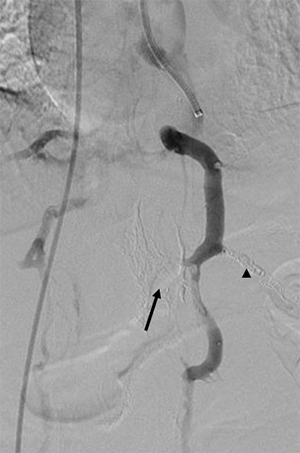
This image, captured during Kelly's procedure, shows occlusion of the CSF-venous fistula with Onyx embolization (arrow). Dr. Boddu also performed a coil embolization of the adjacent intercostal vein to avoid Onyx reflux (arrowhead).
Part of that recovery process, as Dr. Boddu told Kelly, would be “rebound headaches.” After three years of low pressure, her brain would suddenly need to adjust to normal levels of CSF. Rebound headaches are predictable, normal, and thankfully temporary. That doesn’t make them any less difficult, and Kelly was glad she’d been prepared for them.
“What had helped before now hurt,” she says. “Lying flat used to give me relief, but afterward it caused my rebound headache to be worse, so I was put on medication to control the fluid. I was able to go home from the hospital after two days, but bouts of blurred and double vision caused me to return to Dr. Boddu. The increase in fluid had caused pressure on my eyes, so I saw Dr. Marc Dinkin, a neuro-ophthalmologist who works with the CSF leak team. Dr. Dinkin recommended a temporary increase in dosage, and thankfully the double vision subsided. I was slowly taken off the medication, and after a few weeks I returned to a sense of normalcy. Best of all, I have not had a headache since!”
“Dr. Boddu is my hero! He and Maggie Yu gave me my life back."
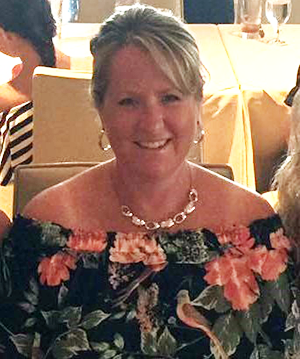
Kelly Olivo is now recovered and has her life back.
With the whole experience in the rear-view mirror, Kelly has had time to reflect on her journey. “Dr. Boddu is my hero,” she exclaims. “He and Maggie Yu, his nurse practitioner, gave me my life back. The headaches and extreme fatigue are gone, and my memory and focus have improved. My family life and social life are back to my time pre-headache. And I owe it all to the extremely competent staff at the CSF Leak Program. There was never a time during my entire experience that I didn't have total confidence in the team. They were all on the same page from start to finish, and I’m thankful for that.”
More about the CSF Leak Program